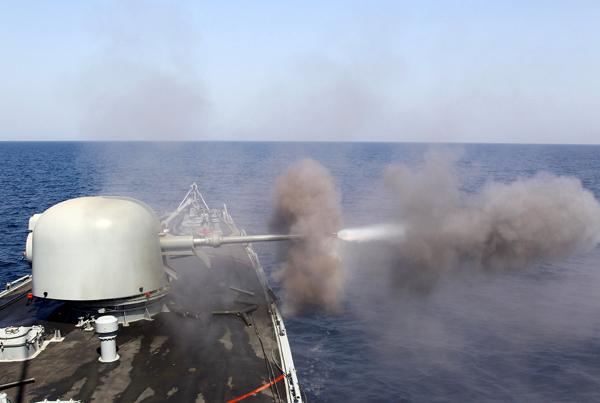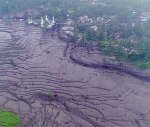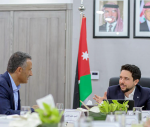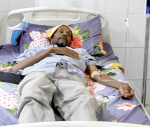You are here
Yemen’s Hadi rejects UN peace plan amid deadly raids
By AFP - Oct 29,2016 - Last updated at Oct 29,2016
ADEN/RIYADH — Yemen's president on Saturday rejected a UN peace proposal for his war-battered country, as rebels said air strikes by his Saudi-led coalition allies killed 17 civilians.
Forces loyal to President Abed Rabbo Mansour Hadi's government have been locked since 2014 in deadly battles with Iran-backed Shiite Houthi rebels who overran Sanaa late that year.
The conflict escalated in March 2015 when Saudi Arabia launched a military campaign to push back the rebels.
The war has left nearly 7,000 people dead, mostly civilians, according to the United Nations which had been struggling to convince the warring parties to implement a ceasefire and revive a stalled political process.
The latest peace proposal submitted by UN envoy Ismail Ould Cheikh Ahmed was rejected by Hadi who even refused to receive it as he met the mediator in Riyadh.
The contents of the roadmap which the envoy already presented to the rebels on Tuesday have not been made public.
But informed sources say it calls for agreement on naming a new vice president after the rebels withdraw from Sanaa and other cities and hand over heavy weapons to a third party.
Hadi would then transfer power to the vice president who would appoint a new prime minister to form a government in which the north and south of Yemen would have equal representation.
A statement on the government's sabanew.net quoted Hadi as saying the roadmap "only opens a door towards more suffering and war and is not a map for peace".
It cited Hadi as saying the plan "rewards the putschists while punishing the Yemeni people and legitimacy".
It was unclear how Hadi's Arab backers would react to his refusal, especially after a key coalition member, the United Arab Emirates, hailed the proposal on Thursday as a "political solution for the Yemeni crisis".
In August, US Secretary of State John Kerry outlined a similar plan which offered the Houthi rebels participation in government in exchange for an end to violence and a surrender of weapons to a third party.
Gulf states, most of which are members of the coalition, had “agreed unanimously” with that initiative, Kerry said at the time from the Saudi city of Jeddah.
But Saudi Arabia has not commented on the UN envoy’s latest proposal and the rebels have yet to respond.
Warring parties in Yemen are under mounting international pressure to end the conflict that has left the already-impoverished country grappling with increasing cases of malnutrition and a spread of disease.
The coalition, for its part, is under pressure over for the high civilian death toll from its bombing campaign.
On Saturday, four air strikes hit three residential buildings killing 17 people and wounding seven others in the battleground town of Salo, southeast of third-city Taez, according to rebel-controlled media.
There was no immediate comment from the coalition.
But a local Yemeni official loyal to the government said the coalition air strikes had hit three adjacent homes by mistake.
“All those in the houses were killed,” he told AFP, adding that a child and seven women were among the dead.
Central bank bombing foiled
Those killed in Saturday’s air strikes numbered among the three million Yemenis displaced by the war since last.
Hadi himself resides in Riyadh along with most senior officials while security in second city Aden, where the government had set up temporary headquarters, remains fragile.
Guards in Aden on Saturday thwarted a suicide attack on the central bank, opening fire on the bomber’s vehicle and blowing it up before it reached the building, a security official said.
The bank has been based in Aden since Hadi last month ordered its relocation from Sanaa, accusing the rebels of running down Yemen’s foreign reserves.
Five guards were wounded when the bomber’s vehicle blew up around 30 metres from the bank building, the security official told AFP.
The bank’s relocation has been a major blow to the rebels, forcing them to halt salary payments to state employees in the large areas of the country they control.
A UN report released in August found that the rebels and their allies were diverting about $100 million a month from the central bank, and that its foreign reserves had dwindled to $1.3 billion from about $4 billion in November 2014.
‘Missile shot down near Mecca’
Meanwhile, Yemeni rebels have launched one of their longest-range strikes against Saudi Arabia, firing a ballistic missile that was shot down near the holy city of Mecca, the Saudi-led coalition said on Friday.
The rebels insisted that the missile had targeted Jeddah, the Red Sea city in the sprawling Mecca region, not the holy Muslim city
The coalition has been carrying out a bombing campaign against the rebels since March last year and there have been rebel strikes towards their air bases.
Saudi Arabia has deployed Patriot missiles to intercept the rebel fire.
Houthi rebels launched the missile “toward the Mecca area” on Thursday from their Saada province stronghold across the border, a coalition statement said.
“The air defence was able to intercept and destroyed it about 65 kilometres from Mecca without any damage.”
The rebels’ sabanews website said their ballistic missile targeted Jeddah International Airport.
Islam’s holiest sites are located in Mecca and Medina.
The six-nation Gulf Cooperation Council condemned what it called “clear evidence” that the rebels are unwilling to accept a political solution to Yemen’s 19-month-old conflict.
The United Arab Emirates’ Foreign Minister Sheikh Abdullah Bin Zayed Al Nahyan went further, criticising Iran for the attack.
“The Iranian regime backs a terrorist group that fires its rockets on Mecca... Is this an Islamic regime as it claims to be?” he wrote on Twitter.
Qatar called the attack “a provocation to the feelings of millions of Muslims worldwide”.
All GCC states, apart from Oman, are members of the Saudi-led coalition. The UAE itself is a major pillar of the Sunni alliance.
The coalition and the United States accuse Shiite-dominated Iran of arming the rebels, a charge Tehran denies.
The Houthis are a minority group belonging to the Zaidi sect of Shiite Islam. They fought six wars against Yemen’s government between 2004 and 2010.
In a statement on sabanews.net, Houthi spokesman Mohammed Abdulsalam accused Saudi Arabia of “political nonsense”.
“The Saudi regime which claims it intercepted the missile 65 kilometres away from Mecca which is holy and precious to the hearts of every Yemeni and Muslim could have avoided such media platitude and political nonsense by directly mentioning the city of Jeddah where a military target for the ‘Burkan 1’ missile lies on its northern outskirts,” said Abdulsalam.
Iranian Foreign Ministry spokesman Bahram Ghassemi called the claims that a missile was fired at Mecca “ridiculous”, the official IRNA news agency said.
Mecca lies more than 500 kilometres from the border.
It is the second time this month that the rebels have fired a missile of that range.
Related Articles
RIYADH — Two missiles fired from rebel-held territory in Yemen fell short of a US warship patrolling the Red Sea off the coast of the war-to
ADEN — Three Yemeni soldiers were killed on Saturday when a mine they had “dismantled” and taken away in their vehicle blew up as they stopp
ADEN — More than 40 troops and rebels have been killed in several days of clashes between Yemen’s Saudi-backed army and insurgents allied wi













